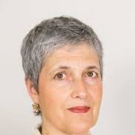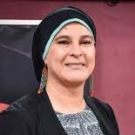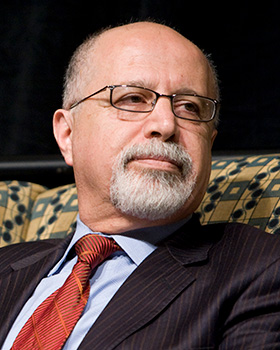Speakers

Ellen Laipson
Distinguished Fellow and President Emeritus
Stimson Center

Aaron David Miller
Vice President for New Initiatives and Distinguished Scholar, Middle East Program
Wilson Center

Manal Omar
Vice President, Center for Middle East and Africa
US Institute of Peace
Moderator
Event Summary
On June 29 the Arab Center Washington DC (ACW) hosted a panel discussion on the impact of the presidential elections on US policy in the Middle East. As the 2016 presidential election approaches, four distinguished experts offered differing views about the challenges the next President will face in formulating American policy toward this turbulent region.
In his introduction, ACW Executive Director Khalil E. Jahshan urged the panelists to focus on five main topics:
- The next administration’s potential role in democracy promotion and respect for human rights in the Arab world;
- Sketching a general profile of the next administration that can restore some measure of credibility in the Middle East;
- The next administration’s realization of the US vital interests in the region and need for long-term strategy to achieve those interests;
- Changes to US Middle East policy that can produce more effective and stable outcomes in Iran and Iraq; and
- Arab public opinion response to either Hillary Clinton or Donald Trump as president.
According to Aaron David Miller of the Wilson Center, US policy in the Middle East is derived from many different factors, including congressional oversight, presidential prerogatives, lobbying groups, public opinion, etc. Regardless of the respective positions of Clinton and Trump, US Middle East policy will be driven more by the opportunities and constraints in the region than by anything the candidates wish to achieve. Solving the problems of the Middle East – the lack of leadership and institutions necessary for positive and transformative change – will require a fundamental change in the region, which is not easily available. These challenges are likely to lead both Clinton and Trump to undertake a policy of risk aversion rather than risk readiness; the challenge will be to strike a balance between the two.
Miller argued that both candidates have a common interest even though there is much that divides them. Both are averse to nation-building and the commitment of US ground forces in regional conflicts. Both argue pragmatism on certain realities like dealing with Putin in the region. With regard to Israel, there is very little separating Trump and Clinton; both will court Israeli Prime Minister Netanyahu.
Nor should the Palestinians expect too much from the next President, Miller said. Trump is open to Israeli annexation of the West Bank, a complete diversion from traditional US policy. He may not get much support from the US public on this position. Millennials for example, have shifted views on the Israeli-Palestinian conflict. They see the issue as a subset of cosmopolitan human identity, and are pushing for a more equitable foreign policy, especially among Sanders supporters. Nearly half of Democrats support sanctions against Israeli settlements (a subset of the global Palestinian-led BDS movement). Many Democrats are walking away from the two-state solution, whereas Arabs and Jews are equally divided on the question. While Democrats have moved to a more even-handed approach, Republicans have shifted to a more hardline Likud position.
The realities of character and temperament, both in terms of leadership and confronting serious foreign policy challenges are factors for both candidates according to Miller. The next president will have to exhibit prudence and wisdom in making crucial foreign policy decisions. He or she cannot rely on advisors alone. Finally, the next President must understand that Congress will have a difficult time supporting objectives, particularly if US troops are involved, without some measure of return. How risk ready the public and Congress will allow the next president to be is the key variable on how the president will respond to the crisis of the day. He or she should be prepared to deal with numerous constraints in this regard.
Responding to a question on how to deal with imperfect partners in the region, Miller presented a sobering assessment. With regard to Israel, the next President and Netanyahu will eventually annoy each other. US-Saudi relations may break down and the US will likely be responsible for its security. Additionally, the North American energy revolution profoundly changes US dependence on Middle East oil. If the US is dependent on imperfect partners, how do we forge relationships? It is unknown precisely how the next president will process all of these variables.
Turing to Iran as a unique component in US policy, Ellen Laipson of the Stimson Center addressed the Iran nuclear question. The Joint Comprehensive Plan of Action (JCPOA), she stated, is an international agreement intended to bring Iran back into compliance with Nuclear Nonproliferation Treaty (NPT) to which Iran is a signatory. According to Laipson, the JCPOA is not a bilateral treaty but rather an agreement conducted on behalf of the UN system, the P5+1 group, to achieve Iran’s compliance with the NPT. Some observers in the US may believe that Iran’s pursuit of nuclear weapons will continue, others believe it will not. In any event, the next US president cannot be an obstacle to the JCPOA. Congressional actions seek to limit the president’s authority to implement the JCPOA or to renegotiate the JCPOA; however, from a legal standpoint there is very little authority to do so. Odds favor the ongoing implementation of the JCPOA. The challenge for the next president will be to keep channels open with Iran. The sale of planes by Boeing may create business opportunities. Laipson reminded the audience that Iran was a major trading partner before the revolution and sanctions. Clearly, disagreements between the US and Iran will continue, but more texture should be given to Iran’s private sector and civil society, while keeping expectations for change low.
According to Laipson, candidates may shift their tone on non-nuclear issues, such as Iran’s activities in the region, for example ratcheting up its commitment to non-state actors. There may be a perception the Islamic Revolutionary Guards Corps (IRGC) need to flex their muscles in exchange for the concessions made on the JCPOA. Expectations on how much the US can influence Iranian behavior in the region should not be overly optimistic. There is little the US can do to persuade Iran to end some of its confrontational policies. Iran’s role in Syria is a separate issue and the US will continue to have limited influence. Laipson predicted there will be no change in the rhetoric that the US and Iran are at war with each other, nor will either candidate grasp the Kerry spirit of beginning a path to normalization. With regard to the Gulf States versus Iran, expectations are that both candidates will be more robust in supporting US Gulf allies, and more cooperation on counterterrorism will occur.
Manal Omar of the US Institute of Peace offered an assessment of the cost of the elections in a volatile region. The US, she stated, is looking at a global crisis from the Middle East – not a Middle East crisis. This is an important shift that affects all nations, whether it is the movement of refugees, effects on economy, political upheavals, or the fight against violent extremism, all nations are involved. To frame policy in terms of what happens in the Middle East is no longer containable, and thus reactions and solutions cannot come only from the Middle East, but need to be owned by the international community. Another issue raised by Omar is the tension between long-term and short-term policy. The US is at a boiling point where the crisis in the Middle East is about to implode, primarily due to US short-term strategy and how we fight internationally. Therefore, the US needs to shift its thinking to how the US can begin to influence events.
One of the most influential fights is the fight against violent extremism. Omar stated that the US is afraid to admit the painful reality that ISIS has learned the lesson of the next century, which the US has not learned: the power of no borders (multiculturalism) and the significance of fragile cities. With regard to fragile cities, as opposed to responding only when full states become fragile, had the US focused more attention on Benghazi than on the nation of Libya, it might have been better equipped to deal with the ensuing chaos and extremism. ISIS has been on the terrorism list since 1996, and did not sneak up on us. ISIS has learned branding and has used it well. With branding came franchising which allows ISIS more media attention, coalition building and political traction.
Turning to the refugee crisis, a prime target for ISIS recruitment, Omar assessed much attention and preventive work needs to be done now. The US has lost the positive momentum at the grass roots level. Reforming institutions is the biggest challenge for the US. As to how the US can effectively reform institutions, Omar pointed to efforts by the Atlantic Council and Middle East Task Force that have focused attention on the long-term need to deal with refugees and societies. According to Omar, most institutions do not do the cross-border work that needs to be done. Moreover, the US cannot wait for post-conflict, or nation-building; that conventional sequence of events does not apply anymore. The US must be the advocate and champion for these societies if it is to prevent ISIS from swelling its ranks.
In response to what exactly US assistance can achieve, Omar opined what is needed is a full comprehensive strategy, without an emphasis on security assistance. Even the US military agrees with this premise. What is needed are large scale diplomatic interventions. Security and humanitarian assistance are only band aids that do not address the root of the problem. Unless addressing the roots of the problem, the US will never be able to meet the humanitarian needs
The fourth expert, Dr. Shibley Telhami of the University of Maryland posited there are too many variables that are outside the control of the US. US foreign policy priorities will be determined by these outside events. He sees continuity in US foreign policy, particularly if Clinton is elected. Her policy is likely to be only marginally different from that of President Obama, Telhami stated, doubting that she will have much to add that will profoundly affect US policy. Expectations for a Trump presidency are unknown; although his comments are “very frightening,” there is little in his rhetoric to substantially evaluate his positions.
According to Telhami, every president has been and will be constrained by public opinion and Congress. Public opinion opposes a huge US footprint in the Middle East, even when the US made the case for striking Assad. Public opinion sees ISIS as the number one priority for the US. Egypt, Saudi Arabia, Israel/Palestine, and Iran are not viewed as priorities by the American public.
Professor Telhami was somewhat optimistic on how the next president will be received by the Arab world. Regardless of who wins, the US is still the greatest power in the world and must be dealt with even in the face of distrust by Arab public opinion about US intentions. Nonetheless, the Arab world remains deeply divided with regard to US intervention in conflicts in the region.
In terms of a working relationship between the US and Arab states, Telhami contends that Arab leaders will be comfortable with Clinton as she has cultivated an “image” of an interventionist, which he disagrees with. According to Telhami, Arab states believe that they will get “Obama plus” with some more muscle from a Clinton presidency. Trump, however, is a source of discomfort in the region, particularly in view of his statements on Islam. Telhami argues, however, that not everyone in the Arab world is frightened by Trump. Business elites, particularly in the Gulf, are relatively comfortable with him and not that troubled by his defense of authoritarian leaders. Trump’s militancy with regard to Islamic groups resonate with some, especially Egypt and Gulf leaders. Yet, Telhami insists, expectations from Trump are unknown.


